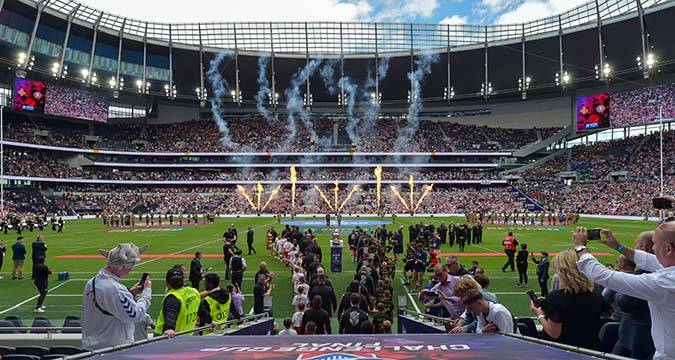
It was more OMG than IMG on Saturday as Rugby League was given the biggest image-boost in decades with the BBC’s cutting-edge coverage of the Challenge Cup Final at Tottenham Hotspur’s incredible new stadium.
With Wembley double-booked, the decision to switch to the stunning space-age venue projected the sport in a brilliant modern light, with lead TV presenter Mark Chapman summing up the whole event as: “We’ve seen a Challenge Cup Final for the ages in a stadium for the ages.”
He was spot-on, a thriller of a game decided by a late try was nearly eclipsed by the sheer stunning beauty of the surroundings.
The BBC’s decision to have the pre-match national anthem sung from the rooftop gave a scary futuristic edge to the coverage and their footage of supporters looking to the skies and jaws dropping at the sight of Twinnie perched beside the golden cockerel of Spurs was an unforgettable moment.
It certainly eclipsed the days of Bernard Cribbins singing ‘On Ilkley Moor Bar Tat’ or ‘She’s a Lassie From Lancashire’.
The game’s annual big day out in London has always been our greatest opportunity to shine, with the BBC devoting all its imagination and resources to its detailed and lengthy coverage.
We can watch Rugby League on Sky, Premier Sports, Channel Four and all kind of apps these days but no-one does it better than the Beeb.
From the opening shots of the stadium with Chapman and joint four-time Cup-winners Jamie Peacock, Kevin Brown and John Wilkin all suited and booted at a space-age silver table, to the closing scenes with victorious Wigan coach Matt Peet invited to give his emotional insights, the punditry panel was pin-sharp with analysis.
There was a gravitas to the coverage, sprinkled with the natural humour of Chapman and Wilkin, while the pitch-side reporting of Tanya Arnold and Damian Johnson gave pace and precision to the events of the day.
Even Robbie Paul, who sometimes seems lost and dizzy within the whirling camerawork in the players’ warm-up, looked settled and composed.
The laser-beam brilliance of uber-produced interviews with Jermaine McGillvary and Matt Peet had an edgy modern documentary feel, before a subtle switch to the solemn words of tribute to the late Maurice Lindsay, which was peak BBC.
Only the nation’s broadcaster carries this kind of authority, with an easy seamless gear-change between Chappers and Wilkins’ irreverence and heavyweight dignified authority on such serious topics.
It’s this unique ability that makes the BBC so precious to Rugby League. Just when we were getting giddy with excitement at the new stadium, roof-top pop stars and slick young production techniques, along came three comfortable pairs of slippers for us to settle down and watch the game in.
Dave Woods, Johnathan Davies and Brian Noble are so effortlessly at ease with each other and familiar to viewers that it’s like being down the pub watching the match with your old mates Woodsy, Jiffy and Nobby.
Understated, polished and poised, the three commentators guided us steadily through the match, although they could have upped the volume and intensity as the game reached a crescendo.
“They’ve given it to the see-you-later twins,” said Noble as Bevan French and Jai Field cut loose, but there was little further hyperbole as the game boiled to the brink.
Our game does lack a Martin Tyler “Agueroooo” moment and I’m not sure either of these three have it in them. Then again, this is the BBC and there are standards of decorum to maintain.
It’s these standards and decades of experience that make the BBC’s coverage an essential lifeblood for our game.
Saturday’s production was the best I’ve ever seen our sport presented on national television.
There have been better games, but never have I seen such slick, professional and modern broadcasting techniques aligned with empathy and understanding of the game.
So it wasn’t just the stadium that made my jaw drop. If the BBC maintain this level of skilled broadcasting of Rugby League, then October’s World Cup coverage of over 60 matches could be a watershed moment for our sport.
The above content is also available in the regular weekly edition of League Express, on newsstands every Monday in the UK and as a digital download. Click here for more details.
